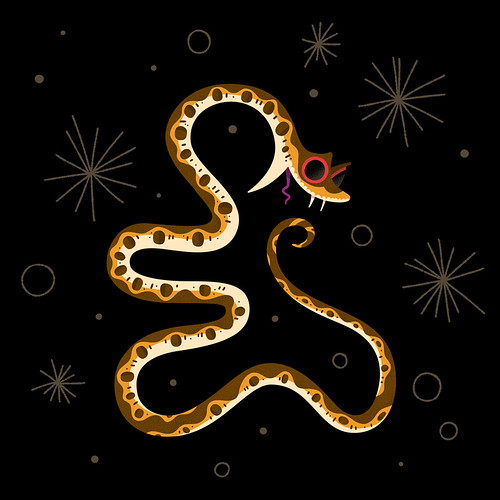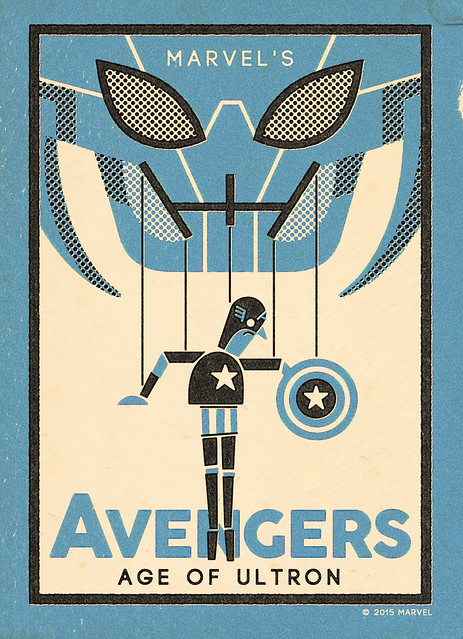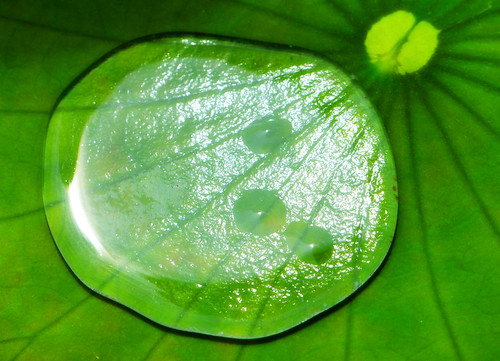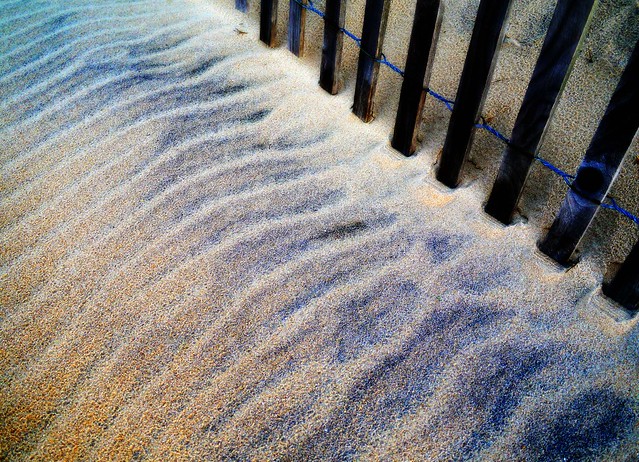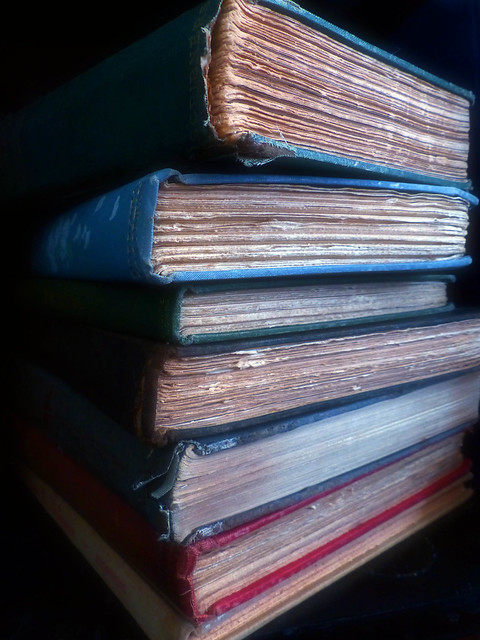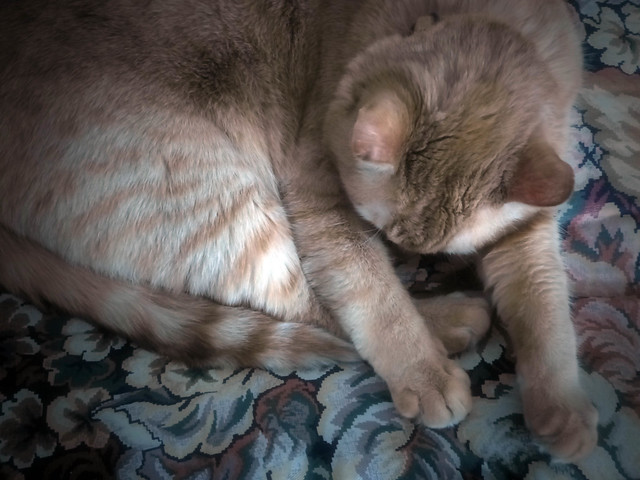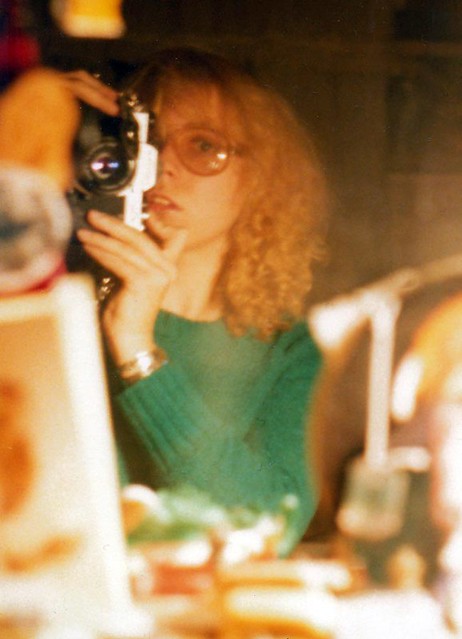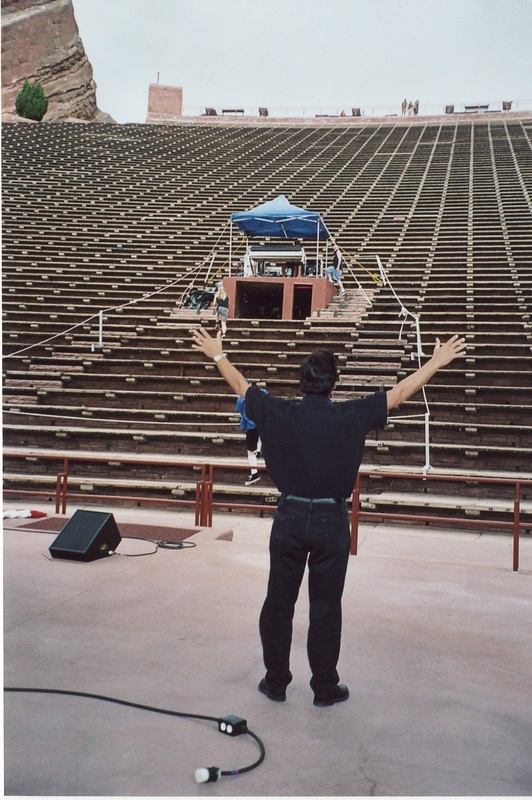Andrew shares his journey of being an illustrator, his love for cookies, one of his methods of getting bad ideas out, and how his stinginess has amusingly become prevalent in his approach to investments.
Leigh Lim: Hi Andrew, thanks for taking the time to do a Q&A! While on your site I noticed on the upper right hand corner the picture of a fist that morphs into a ‘thumbs up’ if I hover over it. Has that been a new addition when you last revamped your website?
Andrew Kolb: Oh I’m glad you noticed! I wanted a quick link to my Facebook page and a friendly thumbs up seemed like an appropriate gesture.
LL: Why do you think you do the things you do?
AK: This can quickly get existential but I think my main driving force is making a strong connection between my mental and physical output. The hardest part, for me, is getting what’s in my head out onto the page. Sometimes it’s close and sometimes it’s not, but I continually strive to better connect the two.
LL: Can you give a quick summary in terms of how you got to where you are as an illustrator?
AK: Oh I don’t feel like it’s a very exciting story. I feverishly drew as a child and continued to do so in my young adulthood. An art teacher directed me towards design, and that’s what I studied/worked as for a number of years. Slowly I realized I needed to transition more exclusively to illustration and the rest (after a slow fade from one into the other while also freelancing) is history!
LL: Does that mean you just drew everything that caught your eye? (no particular theme of drawings you were particularly drawn to? Meaning…you didn’t draw mostly…eagles…etc?)
AK: Sadly I didn’t draw nearly enough eagles in my youth. I really liked making something that people could recognize so I often drew existing characters (a trend that carries on to today).
LL: Do you have specific books that you keep within reach that you regularly refer to?
AK: Not particularly. It usually depends on the project I’m working on and that will define what references from which I’m pulling.
LL: Can you share maybe three examples?
AK: Well there are two books that I couldn’t live without: The Graphic Artists’ Guild Handbook of Pricing and Ethical Guidelines and Business & Legal Forms for Illustrators. These combined are what took me from casual artist to a somewhat legit freelancer.
LL: Are there any challenges that come to mind during your learning process?
AK: I think the biggest challenge in my learning process is refining my communication skills. It’s ongoing but without the ability to get your thoughts and opinions across to the client, you won’t be able to effectively collaborate.
LL: So, a bit more like making sure the client and yourself are both on the same page before going to the next step of the process? (I’m interested to hear your thoughts relating to how you would approach if you were dealing with a client when after you’ve explained to him/her for 3-5 times what your vision is — or why specific changes would be helpful. And they still don’t get it. Would you pull the plug on the project? Refund their payment and mention that you’ve made a mistake committing early on and now know that there isn’t a fit?)
AK: No nothing that drastic. If I’ve committed to the project then I’ll see it through to the end. If, however, the experience was one where neither were really satisfied at the end then I’d probably have to really think on it before working together again. And to be fair, they’re likely feeling the same way. At the same time I’ll also reflect on the experience to get a sense of what worked and what didn’t. Maybe I wasn’t properly communicating and perhaps I need to approach the conversation in a different way next time!
LL: If you were to put together a ‘learning plan’ or practice pack for someone who hasn’t paid attention to how they approach their drawings before, so they could have the capacity to write at your level and skill. What would it look like?
AK: I think everyone’s journey is unique but a consistent element for growth is reflection. Look back on your work and try to figure out what you like and don’t like about it. Look at other’s work that inspires you and define what it is that you like. Do the opposite for work that repulses you. Collect this info and just reflect on it.
How can you take what you like and make more of it? How can you mitigate what you don’t like about your own and others’ work? There’s no single answer to these questions but asking them in the first place is what’s most important.
LL: Artists are known to be very protective for their work. What would you say to someone who can’t seem to let go, and share their ideas/work — while it is in progress?
AK: An interesting observation! For the longest time I didn’t share process work because I thought it was uninteresting, and yet I was always fascinated to see the processes of other artists. I would say to this hypothetical person that they’re adding beauty to the world and that the kindest gesture would be to share that beauty with others.
LL: Would you say it was discipline that got you to where you are as an illustrator?
AK: Perhaps a mix of discipline and perseverance. It’s tough to overcome the early work that you know isn’t your best but you have to keep going if you’re going to get better.
LL: Do you keep before and after photos?
AK: I don’t necessarily make a conscious effort but the Internet does a pretty good job of reminding you of your past. I still have people reference work that’s no longer on my site because it’s 5 years old and outdated.
All you need to do is go back to your earliest Flickr post or Tweet to get a quick reminder of where you started.
LL: How important was it to have someone help you learn a specific technique?
AK: I would say the most important lessons I’ve received haven’t been technical but were more ethereal. It’s important to talk to other people in your industry at different levels (more or fewer years than you) so that you can get a good perspective on how you’re doing. They might be able to provide you with direction or suggestions that you couldn’t conceive simply because you haven’t been around as long as them.
LL: Favourite time of the day to work?
AK: I like the feeling of getting a lot of work done in the morning. If I finish a project in the AM then it feels like anything that happens after lunch is a bonus.
Is this sensible? No. Is it how I feel? 100%.
LL: How much do you plan before you start a project?
AK: I always start with pencil and a sheet of paper/sketchbook. Sometimes it’s just to get the bad ideas out but I never start right on the computer; there’s too much commitment there.
LL: How long would you say it takes, for you to complete an illustration?
AK: It really depends on the complexity of the project. A single character image can probably be done after a few hours, but I’ve also spent hundreds of hours on more complex images. I try not to time my work too much as I find it limits creativity.
That’s not to say I don’t track my hours, I just don’t say I’ll complete a project after spending X amount of time on it.
LL: How would you describe your style?
AK: Genial with a touch of overthinking.
LL: What are some misconceptions you find about you as an illustrator?
AK: This is weirdly specific but if I was paid every time someone said they thought I did my work in Illustrator, I could retire today. I think there’s also a misconception about freelance in general that it’s all weekends all the time.
The truth is that you have to be more disciplined as a freelancer than if you were employed. Yes there are perks, but if you chase those perks for too long then they start to be what ruins your business.
LL: Why do you think you get that comment a lot?
AK: Hmmmm. I’m not exactly sure why! Perhaps it’s the relative geometry with which I work or maybe because I don’t do a lot of painterly executions (something I’m working on right now!) so I think the assumption is “not paint = illustrator”.
This is a gross generalization but maybe that’s what’s happening?
LL: Can you give an example of how one of your days look like?
AK: No two days are identical but I try to keep to a general structure. I start the morning with emails for 15–30 minutes and then get to “work”. That could mean research or sketching or admin but what matters is that I’m not constantly checking emails. I’ll spend the last 15–30 minutes before lunch checking social media and then I take a break.
That process repeats after lunch (and sometimes after dinner) and I find it helps to break the day up into chunks.
LL: 15-30 minutes checking email. How are you able to stick with your time limit?
AK: I admit it’s not a hard rule. Sometimes it’s quiet and I only need a few minutes to reply to what’s in my inbox. Really what I’m getting at is that I don’t constantly check my emails. I scan the emails to see what’s most pressing, and then reply to those first. If I have time to start working on a more casual email then I will.
What this helps avoid is an email conversation as that starts to really eat up precious time.
LL: Are you learning something specific at the moment?
AK: I’ve been exploring more restrictive palettes and, quite separately, trying to be more loose with my execution. I love a painterly aesthetic and I want to leave a softer impression with my imagery.
LL: Can you share three approaches you take that helped you become a better artist?
AK: Hmmm. Top three pieces of advice/approaches I find works:
- Draw every day (in any capacity and without too much filtering)
- Read a lot (business books, biographies on people who inspire you, stories about subjects you’d like to illustrate, whatever!)
- Don’t be too hard on yourself (being unhappy doing the work that you love is a very difficult feeling to overcome).
LL: What usually is the sign you look for that will give you the signal that it’ll be the take/version you like?
AK: This is so tough to say but I just kinda know. I’ll do a sketch and know ahead of time if they want to change something or not. It’s not a 100% guarantee but once you get to know your collaborators it makes the process so much smoother.
LL: What’s your go-to set-up?
AK: My day, when planned, is generally structured with emailing being the first half hour of the day, after lunch, and before I wrap up the day. Sometimes emergencies will negate that but it helps me focus when I know I don’t need to check something every 10 minutes.
LL: Did it take awhile for you to settle on the kind of set-up that you like?
AK: The transition from my drawing tablet to a screen based tablet was a big hurdle. I didn’t realize how accustomed I’d gotten to looking in a different direction than where I’m drawing, but that mental shift took a while to correct.
LL: What’s part of your arsenal at the moment?
AK: Well I use a mac mini outfitted with a Cintiq 22hd, Creative Suite CS5, and a second monitor to have research/comments visible while I’m drawing. My mouse and keyboard are as integral as the drawing stylus and music or a podcast is running in the background.
I’ve probably also just recently eaten a cookie.
LL: Has your equipment undergone customisation?
AK: Not much. I make a few custom brushes but outside of that I find I’m a fairly vanilla guy when it comes to my technology; I just need it to work.
LL: Do you have a piece of equipment (or software) that you thought was a good buy at that time, but you eventually didn’t use it as much as you hoped?
AK: Not that I can think of! I try to do a loooooooooot of research before I invest in anything and I think I’m so stingy that even if it wasn’t perfect, I’d make it work somehow.
LL: Have you been always mindful of ergonomics while working?
AK: I recently invested in a standing desk and that helps a lot. I also make sure to get up for regular cookie breaks.
LL: Okay…You’ve mentioned cookies twice already! I have to ask for the readers who are cookie fans: ‘What kinds do you keep within reach?’
AK: Well my mum and sister bake a lot so I usually get the spillover from their hobby. But I actually have a very low bar for baked goods and will eat pretty much anything.
But some faves: Chips Ahoy Rainbow cookies, Chips Ahoy Ice Cream Creations cookies, and Danish Cinnamon
LL: Equipment Maintenance and Storage?
AK: There is one thing. I invested in a fireproof box that I keep my external hard drives in. That’s pretty much it.
LL: Do you keep prints of your illustrations?
AK: I keep a few prints on hand for sale; does that count? Outside of that I usually give copies of my work (like magazines I’m in or greeting cards) to my family members cause they like to see what I’m doing.
LL: Yes! That counts! What’s the magazine/greeting card limit when you buy?
AK: Oh I’m usually sent a few copies by the client and those get distributed as far as I can go. Immediate family is first and then grandparents and friends are next in line. If it’s something really big (like a magazine cover) then I just tell everyone I know so they can buy a copy and get the client to hire me more because that means sales go THROUGH THE ROOF!
LL: I notice you don’t put watermarks on your work. Is that because you’re just trusting that people are inherently honest, and if someone does try to pass your work as their own — it’ll just be a matter of time before they’ll be paying for what they have done?
AK: Interesting. I can’t image someone trying to pretend their work is mine as what does that get them? Eventually they’ll need to create MORE work and I doubt if they’re that they’d be able to recreate the aesthetic. If they CAN then they’re probably talented enough that they don’t need to use someone else’s work. So I suppose that the law of averages will even it all out.
LL: Can you share a bit of background on how some of your illustrations came about?
AK: The Vacation poster came about simply because Mondo had the license and thought I’d be a good fit! I actually did a bit of a process post about that very project over on my blog.
The opposites poster was for a gallery show in France and it was a lot of fun! It was originally intended to just be that piece but after a while it really felt like it could be more than just the one print. I reached out to the Internet in general and a lot of wonderful people helped me translate it into other languages so that it could get into as many classrooms or kid’s rooms as possible!
LL: Mondo? (Is that mondotees.com? This is interesting because — there are a lot of ‘tribute art’ out there that is being sold. Would be interested in hearing about your perspective on how you approach it. Would you not put out publicly any art that has a link to a particular brand? Also! The story behind your collaboration with Mondo! Was it because of an existing relationship? Or did you get your art on their site because someone recommended a previous work you did?)
AK: Tribute/fan art is tricky. I try to draw what I enjoy and occasionally that means working with existing properties. With that said, I also like to add a little something new to the mix (perhaps a different style, or an additional story) and I think that’s what caught the eye of Mondo (though I genuinely have no idea how they came by my work). They approached me about a Yogi Bear poster and I’ve been working with them on various projects ever since! They’re a great group of people and really have a passion for the industry.
LL: What do you find is the best way to serve your clients?
AK: It’s tricky. Every client and every artist is different so I’ll only speak for myself; I think the best way to serve the client is to truly understand what it is that they’re trying to accomplish and offer the best solution you can muster. The client may see the problem as one challenge and you may see it another way, but that’s part of the dialogue.
At the end of the day, communication is what’s key. Listening is a part of that but so is being open with how you feel about what they need and what you’re doing.
LL: With your website, what process did you go through? (Do you do collect notes of the kind of changes you’d like to have, then after 2 years — roll them out?)
AK: Actually, yes! I take note of sites I like and try to parse out why I like them. Those items become a small running list in my head and eventually it spills over into a properly written list. That list translates into rough sketches and eventually a baby site is born!
LL: Are there questions you find yourself answering multiple times?
AK:
- ‘What brushes do you use?’ (I use a few custom brushes and others from Kyle T. Webster).
- ‘What software/hardware do you use?’ (Photoshop and a cintiq)
- ‘What are your influences?’ (Too many to list!)
LL: Do you have a regular schedule of posting blog entries?
AK: I’ve been trying to be more spontaneous with sharing and I like how that’s going. Some projects require postings at certain times (days before a gallery show opens, not until after a project is made public) but process work is generally as I’m working on it and it feels more natural that way.
LL: I have to ask about part of your Twitter Bio (“…keepin’ it clean…”). Does that have anything to do with the kind of illustrations you do?
AK: Yes and no. The whole “Kolbisneat” moniker started as a double meaning since I’m both a tidy guy AND a fairly genial illustrator.
LL: Were there instances when you hesitated about posting something?
AK: Nope! The whole “spontaneous” goal means that I try to not overthink and just share. If it’s a simple sketch on Instagram then that’s okay! There will be more posts like it in the future and one dud won’t spoil the whole lot.
LL: What’s the one thing you have to put time on —- but have been putting off?
AK: I guess updating my website is the big one. Not that I’m putting it off so much as I just have trouble finding the time to take on something so big for myself? I’d rather be drawing anyway.
LL: Would getting someone else to do the work for you an option?
AK: Oh I’d never considered this!
I think when I was doing more traditional graphic design then I’d be comfortable with someone else making edits (usually text or photo retouching). As for illustration, I really feel like they’re coming to me as much for my execution as they are for my ideas so to pass off a stage of the project would be to fall short of what they need.
As for the website, I think I’m trying to be more strategic. Instead of coding from scratch I’m definitely working with templates so I suppose I am happy to release some of the responsibility.
LL: Are you currently mentoring someone?
AK: Actually I am! One of my old design students is looking to get more into illustration so he and I have been chatting about where he wants to go and how he can best get there.
It’s still in its early stages but we’re both having lot of fun! Or at least I hope he’s having fun as well; he hasn’t told me otherwise.
LL: Oh! How did that come about?
AK: Well we’ve kept in touch since he graduated and I’ve occasionally offered feedback on individual projects. So the rapport was already established and we just formalized it and gave the interaction a little more structure!
Again this is my first attempt at something like this so I’ll be the first to admit that I’m making it up as I go along and as he offers feedback. Basically I give him goals to achieve and timelines by which to achieve them. If he doesn’t meet them then we discuss why and revise. If he has questions along the way then I’m happy to chat but I feel something this personal is still an experience to work through on your own.
I’m more like signage on a trail than a tour guide.
LL: What do you do when you come across something that annoys you?
AK: I suppose it depends on what’s annoying me. If it’s something I can change then I start to try to enact that change. If it’s something I can’t affect then I try to remove myself from the situation or change it so that it doesn’t happen again.
LL: Are there certain things you ‘geek out’ about?
AK: Right now I’m reeeeeeally into Dungeons & Dragons. I’ve always been into fantasy but something about role playing and being a proactive part of the narrative is really grabbing me! I listen to podcasts about it. I read blogs from Dungeon Masters. I read the books; anything I can get my hands on!
LL: What were the last 5 things you pre-ordered?
AK: Ha. I rarely preorder BUT I did just preorder the second volume of IDW’s TMNT comic series! They’re releasing the series in these beautiful hardcover books and the first volume is great so when I saw #2 listed I didn’t hesitate for a second!
LL: Are you a big listener of music? (songs/albums that you cannot get enough of? Alternately, you can also share things you like reading about or listening to —- or even your favourite non-musical artists: painters, dancers, sculptors, poets…)
AK: Artists to which I’ll never grow tired of listening: Simon & Garfunkel, The Beach Boys, Sleigh Bells, Andrew W. K., Theophany. Authors whose work I’ll never grow tired of reading: Terry Pratchett, Neil Gaiman, Jonathan L. Howard.
LL: How do you make sure that your media consumption doesn’t overshadow the time you have for your work?
AK: If anything I worry the balance is the other way. I’m so busy with client and personal work that I sometimes forget to take a break! With that said, I try to read every day and am sure to take breaks to see what my peers are doing (both for moral support and inspiration).
LL: Got any peers you’d like to mention?
AK: Oh yeah! Some of my faves to both check out and thank for all of the help are Chris Lee, Meg Hunt, Kevin Stanton, Jared Schorr, Matt Kaufenberg, and James Boorman!
Some are great inspiration for the business, some are great for the ideas, and all are great for the visual expression!
LL: Do you go out of your way to discover new things?
AK: I don’t know if it’s so much about “discover” as it is trusting a few key resources. I try to collate my favourite bloggers and sites so that I can keep up on what they’re recommending for music, games, and books. The Mary Sue and the AV club are two examples of sites with a lot of overlap in tastes. If they’re highly recommending something, chances are I’ll also be on board.
LL: In what way do you approach motivation and inspiration? (Are they both intertwined for you? During days when you’re not so motivated and inspired…would you read a certain book? Think back on a certain experience? Find something random to do?)
AK: I’m not sure if they’re intertwined. I can be inspired by something but it doesn’t immediately motivate me to recreate it or do something else. If anything, it may get tucked away and not pop up again for months!
But when I’m feeling unmotivated I take that time to do the stuff that doesn’t require any inspiration (invoicing, proposals, all the boring admin stuff that makes the world turn).
LL: What makes you smile?
AK: Oh just go to my vine account and look at my likes. They may not all be PG but that gives you a good sense of what makes me laugh.
LL: What’s your view about social media?
AK: Oh I love social media! I think I’m inclined to sit back and observe or respond when approached, but that’s something I’m trying to proactively change. Twitter and Instagram have been invaluable in not only growing as an artist, but connecting me with likeminded creatives who’ve helped me and I can help.
LL: What are your favourite sites at the moment?
AK: Feminist_Tinder on Instagram and Man Who Has it All on Twitter. Clearly I’m a feminist who enjoys biting satire.
LL: Do you currently post on other sites?
AK: One collective to which I regularly submit is Planet-Pulp. It’s a great collective and a nice way to keep up with a community in a casual setting.
LL: Are there websites that you like to visit just because you like the design?
AK: Hmmm. I admit I’m guilty of using an RSS feed aggregator so I don’t often visit the actual sites any longer.
LL: What would you do when you need cheering up?
AK: I usually go to my vine likes.
LL: Do you enjoy collaborating with other artists?
AK: I do! It doesn’t happen very often but when I get the chance I will always say yes to a collabo!
LL: Are you interested in technology?
AK: I don’t suppose I am. Perhaps in the big picture (what technology is breaking ground on a global scale and how that impacts our daily lives, but I usually don’t get very granular on the topic).
LL: If you were asked to pick from the blog posts you have, which one would be your favourite?
AK: Maybe it’s not a single post but I really like my Monthly Media posts. It’s just nice to reflect in some way and while the posts don’t get a lot of likes or reblogs, they do create a lot of conversation and it’s something I value far more than those little hearts.
LL: Are you the type of person that finds it easy to start something?
AK: I do! But I try to balance that with recognizing if it’s a project that I should just as quickly end. Just because I’ve started something doesn’t mean I need to keep going. If I’ve learned from the experience and I’m no longer enjoying it then there’s no need to keep going (I’m speaking exclusively about personal projects).
LL: For seeing your work for the first time, what is the message you’re hoping they’ll take with them?
AK: I’d hope it brings a smile to their face. Or even if it makes them think! Heck if they’re smiling and thinking at the same time then that’d be a dream come true.
LL: What makes your soul sing?
AK: Finishing a good book. The first listen of a new album by a favourite artist. Not having to leave the house when it’s a rain/snow storm. Waffles. That perfect bite of a really unhealthy burger.
LL: What’s the best way to connect with people who admire your work? (sending and replying to individual messages via email or social media? or via your mailing list?)
AK: All of it! I try to keep up with social media comments but I admit they’re more frequent than personal emails. Tweeting at me with a question will usually get a response. Oh I’d say no matter the platform, brevity is key. I’d rather have two or three emails going with short answers than one email with 14 different questions.
(outside of this interview, of course!)
LL: Have you found your tribe yet? (Also, if you’d like to give some guidance to those who haven’t found their tribe yet…where they should start…and how they would know they are in the right track…and when they’ve succeeded in finding ‘their peeps’.)
AK: I think a tribe/family is always changing shape. There are people that I really connected with for a time, and then paths change and that’s okay. There’s definitely a core that’s stuck it out with me and for that I’ll be eternally grateful. Some are further along in their career and some are right on my heels, but I think what matters most is that I trust them fully with whatever I’m bringing (a problem, a celebration, just a random idea, whatever!).
As to where you should start, just trust your gut. I think if you try to force a friendship and you’re not 6 years old then it’ll be a hard feat to accomplish. Reach out to people you respect and admire and if something clicks then great! If not then maybe it’s just not the right time?
LL: What kind of opportunities are you looking forward to?
AK: I’m really excited to getting into more dimensional work. I’m currently exploring 3D and it’s sooooooo insane!
LL: This is probably a good time to bring up 1001 Knights. Are you all talked out about the project?
AK: Oh yeah! So Kevin (whom I just mentioned) brought me on board as he’s 50% of the creative force (along with the ever-awesome Annie Stoll.
Kevin pitched it to me as a way to offer a diverse representation of what a “knight” could be and I was immediately on board! It’s been a little over a year in the making and the Kickstarter has gotten wonderful traction! It started out as purely a labour of love for the curators and the concept and I think that’s the best way to get an authentic marketing experience out of it!
Any eyes on my work based on this anthology is truly because everyone put so much passion into the project.
LL: In what way do you enjoy helping others?
AK: I really like one-on-one interactions. I love teaching and working with an entire class, but when we get the chance to connect in small groups it really is a different experience. Outside of that, any chance to push someone further is great!
I’m guilty myself of putting too many constraints on my own work so helping others break down walls is oddly cathartic.
LL: Looking back through your journey, are you amazed at what you’ve accomplished so far?
AK Yes?
* Andrew Kolb is an illustrator based out of Ontario. If you resonate with any of the information about him, he looks forward to hearing from you. You can see things from his eyes by checking out his Twitter feed or his blog entries.
Source Material and Notes: The material posted is based on correspondence (January-February 2016) between Andrew and Leigh. Content has been edited for length, and the final version has been reviewed and approved by the interviewee.
Leigh Lim is a musician based out of Sydney. You can find a sample of her music here. To reach out to Leigh, you can do so via this form or a direct message through YouTube. (Curious to find out if she’s your kind of person? You can check out her slightly cheeky FAQ.)
Notes:
- If there are things that you’d like to know about Andrew that should be included, please do leave a note (using the second form gives the opportunity to share your request with the WNE community and also to give Andrew the option of answering).
- Corrections and additional information: Spot one?
- If you share a quote from your favorite Q&A on Twitter, don’t forget to use the hashtag ‘#WNEQA‘!
- WNEQA is also on Facebook! 🙂
- This post has been tagged so it could be considered for Long Reads.
- To lock Leigh in to be involved creating your Q&A/FAQ for your page, contact her or fast track your request here.
Interested in reading more?
- Following each Q&A session a separate entry (The Quote Jar: Twenty Two) is posted that would be a companion piece to Andrew’s Q&A.
- How about checking out all the other Q&As?
Want to start a conversation unrelated to the Q&A? That’s okay too! Just use the first form below. 😀 (Or if it is your first time visiting the site — hoping you’d take the time to check this out.)
** For feedback and comments that you wouldn’t mind displayed publicly, you can use the ‘leave a comment link’ below.
